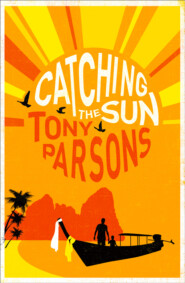По всем вопросам обращайтесь на: info@litportal.ru
(©) 2003-2024.
✖
The Complete Man and Boy Trilogy: Man and Boy, Man and Wife, Men From the Boys
Автор
Год написания книги
2018
Настройки чтения
Размер шрифта
Высота строк
Поля
But we no longer practically had to have a heart attack every time we received a red-topped bill. At last my job was going well.
I was the producer of The Marty Mann Show, a late-night talk show that went out every Saturday on terrestrial television. For the six years before that I had been the producer of The Marty Mann Show back when it was on local radio and most of the country had not even heard the first rumours about its mad bastard presenter. It seemed a long time ago now.
Over the last twelve months Marty and I had turned a no-budget radio show into a low-budget TV show. The line between the two was surprisingly thin. But crossing that thin line was enough to make Marty Mann some sort of star.
If you walked into a restaurant with him, everybody stopped eating and talking just so they could look at him. Girls, who a few years earlier wouldn’t have touched him wearing surgical gloves, now thought he was a love god. He got photographed even when he wasn’t doing anything special. Marty had arrived big time and he had been decent enough to bring me along with him.
The critics, or at least the ones who liked him, called Marty child-like – meaning he was open, frank and intuitive. They thought he asked the kind of questions other interviewers decided it was best not to even think about. And it was true – the editing process that exists in most of us seemed to be completely missing from Marty’s brain. And he got answers, even when what he really deserved was a punch in the mouth.
The critics who didn’t like Marty also called him child-like – meaning he was selfish, immature and cruel. But Marty wasn’t really child-like at all. Sometimes I watched our Pat peacefully play for hours with his little plastic Star Wars toys. That was child-like. Marty’s attention span was nowhere near that long. Marty wasn’t child-like. He was just undeveloped.
We had met at a local radio station where the staff were either on their way up or on their way out. It was a grotty little building full of curdled ambition and stale cigarette smoke, and most of our regular callers were either hopelessly lonely or borderline barking. But I always sort of missed the place. Because that was where I met Gina.
The station was always desperate to get guests – for some reason there was never a mad rush for our cheques, which were so small they were invisible to the naked eye – and so there was often an improvisational element to our bookings.
For instance, when the first Japanese banks started to go bust, the person we booked to talk about what it all meant was not an economist or a financial journalist, but the professor who taught Japanese at the college across the street.
Okay, so he was a language teacher, but like any language teacher he was in love with the country whose lingo he taught. Who better to discuss why the Asian tigers were turning into neutered pussycats? Well, lots of people, probably. But he was the best we could get. Except he didn’t show up.
As if in sympathy with the exploding Japanese bubble, the professor’s appendix burst on the morning he was due to come in, and coming off the bench as his substitute we got his star pupil – Gina.
Tall, radiant Gina. She was fluent in Japanese, apparently an expert on the culture, and she had legs that went on for weeks. I took her into the studio and couldn’t even find the courage to talk to her, couldn’t even look in her eyes. She was beautiful, charming, intelligent. But most important of all, she was also way, way out of my league.
And then when the red light came on in the studio, something happened. Or rather, nothing happened at all. Gina became paralysed with nerves. She couldn’t speak.
When I had first seen her I had thought she was unapproachable. But as I watched her stuttering and sweating her way through her incoherent tale of economic decline, she was suddenly human. And I knew I had a chance. A slim chance, maybe. A snowball’s chance in hell, perhaps. But a chance all the same.
I also knew exactly how she felt. The red light always did that to me too. I was never comfortable in front of a microphone or a camera, and the very thought of it can still make me break out in a cold sweat.
So when it was over and Marty had put her out of her misery, it was not difficult for me to commiserate with her. She was very good about it, laughing at her nerves and vowing that her career in broadcasting was over.
My heart sank.
I thought – then when will I see you again?
The thing that got me about Gina is that she didn’t make a big deal about the way she looked. She knew she was good-looking, but she didn’t care. Or rather, she thought it was the least interesting thing about her. But you wouldn’t look twice at me if you saw me in the street. And someone as ordinary-looking as me can never be that casual about beauty.
She took me for sushi in Sogo, the big Japanese department store on Piccadilly Circus, where the staff all knew her. She talked to them in Japanese and they called her ‘Gina-san’.
‘Gina-san?’ I said.
‘It’s difficult to translate exactly,’ she smiled. ‘It sort of means – honourable, respected Gina.’
Honourable, respected Gina. She had been in love with Japanese culture ever since she was a little girl. She had actually lived there during her year out between sixth form and college, teaching English in Kyoto – ‘The happiest year of my life’ – and she was planning to go back. There was a job offer from an American bank in Tokyo. Nothing was going to stop her. I prayed that I would.
Desperately racking my brain for my little knowledge of Japan, I mentioned Yukio Mishima. She dismissed the novelist as a right-wing fruitcake – ‘It’s not all raw fish and ritual suicide, you know’ – and told me I should read Kawabata if I really wanted to understand Japan. She said she would lend some of his stuff to me, if I wanted. I saw my chance and grabbed it.
We met for a drink and she brought a book called Snow Country. I read it as soon as I got home – a jaded playboy falls in love with a doomed geisha in a mountain resort, it was actually pretty good – dreaming of Gina’s eyes, her legs, the way her whole face seemed to light up when she laughed.
She cooked dinner back at her flat. I had to take my shoes off before I came in. We discussed Japanese culture – or rather Gina talked and I listened, dropping bits of chicken teriyaki on the carpet with my chopsticks – until it was time to call a cab or brush my teeth. And then we were making love on the floor – or the futon, as Gina called it. I was ready to bomb Pearl Harbor for her.
And I wanted her to stay with me forever. So I promised her everything – happiness, endless love and, crucially, a family. I knew the family thing would get her – her dad had buggered off when Gina was four years old, and she had grown up pining for the security of family life. But she still cried when she told the bank that she wouldn’t be going to Tokyo after all.
Instead of living in Japan, she worked as a freelance translator for Japanese companies in the City. But many of them were going under or going home by now. Her career wasn’t what it should have been. I knew she had given up a lot to be with me. If I hadn’t been so deliriously happy, I might even have felt a bit guilty.
After we were married and Pat was born, she stayed home. She said she didn’t mind giving up work for Pat and me – ‘my two boys,’ she called us.
I suspected that the fact her career had disappointed her had as much to do with staying home as wanting a real family life. But she always tried to make it sound like the most natural thing in the world.
‘I don’t want my son brought up by strangers,’ she said. ‘I don’t want some overweight teenager from Bavaria sticking him in front of a video while I’m in an office.’
‘Fine,’ I said.
‘And I don’t want him eating all his meals fresh from the microwave. I don’t want to come home from work too tired to play with him. I don’t want him growing up without me. I want him to have some sort of family life – whatever that is. I don’t want his childhood to be like mine.’
‘Right,’ I said. I knew this was a touchy subject. Gina looked like she was ready to start bawling at any minute. ‘What’s wrong with being a woman who stays home with her kid?’ she said. ‘All that ambition stuff is so pathetically eighties. All that having-it-all crap. We can get by with less money, can’t we? And you’ll buy me sushi once a week, won’t you?’
I told her I would buy her so much raw fish she would sprout gills. So she stayed home to look after our son.
And when I came back from work at night I would shout, ‘Hi honey, I’m home,’ as though we were characters in some American sitcom from the fifties, with Dick Van Dyke bringing home the bacon and Mary Tyler Moore making bacon sandwiches.
I don’t know why I tried to make a joke of it. Maybe because in my heart I believed that Gina was only pretending to be a housewife, while I pretended to be my father.
Three (#ulink_e060f00d-45ae-521f-abb0-eb5cf5997690)
Marty grew up eating dinner with the TV on. Television had been his babysitter, his best friend, his teacher. He could still recite entire programming schedules from his childhood. He could whistle the theme tune to Dallas. His Dalek impersonation was among the best I have ever heard. The Miss World contest had taught him everything he knew about the birds and bees, which admittedly wasn’t very much.
Although I was nothing like him, Marty took to me because I came from the same sort of home. That doesn’t sound like much of a basis for friendship, but you would be surprised at how few people in television come from that kind of background. Most of the people we worked with came from homes with books.
When we first met at the little radio station we were both what was laughingly referred to as multi-skilled. Marty was mostly skilled in fetching sandwiches, sorting mail and making the tea. But even then his grinning, pop-eyed energy was such that everyone noticed him, even if nobody took him seriously.
I was in a more elevated position than Marty, writing items, producing shows and sometimes very nervously reading the news. As I said, I was always lousy at coming alive when the red light came on – only slightly better than Gina. The red light came on and, instead of coming alive, I went sort of dead. But it turned out to be what Marty was born to do.
When we suddenly lost the regular presenter of our late-night phone-in – the nut shift, we called it – to a job in cable television, I persuaded the station to give Marty a shot. Partly because I thought he would be good at it. But mostly because I was terrified of having to do it myself.
Amazingly, he worked wonders with the most unpromising material imaginable. Five nights a week Marty took calls from hangers, floggers, conspiracy theorists, alien watchers and assorted loony tunes. And he turned it into good radio.
What made it good radio was that Marty sounded like there was nowhere else he would rather be than chatting to the mouth-foaming denizens of nut nation.
We slowly started to build what they call a cult following. After that, we very quickly began to get offers to put the show on television. People bought us lunch, made flattering noises and made big promises. And very soon we abandoned our successful radio show, a rare case of rats deserting a floating ship.
But it was different on television. We couldn’t just let our guests practically wander in off the street as they had done on radio. Amusing lunatics who had been impregnated by randy aliens were no longer quite enough.
After a year fronting his own show, Marty still looked like he was exactly where he wanted to be. But the strain was starting to tell, and every week he needed a little more time in make-up to cover the cracks. It wasn’t just the seven-day stress of finding good guests that was putting those licks of grey in his bottle-blond hair. When we were on radio, Marty had nothing to lose. And now he did.
He was in the chair of the make-up room when I arrived at the studio, brainstorming about future guests to the group of young women who surrounded him, hanging on to his every wishful thought while the make-up girl attempted to make his skin look vaguely human for the cameras. He dubiously sipped the glass of water which had been placed in front of him.
‘Is this Evian?’











